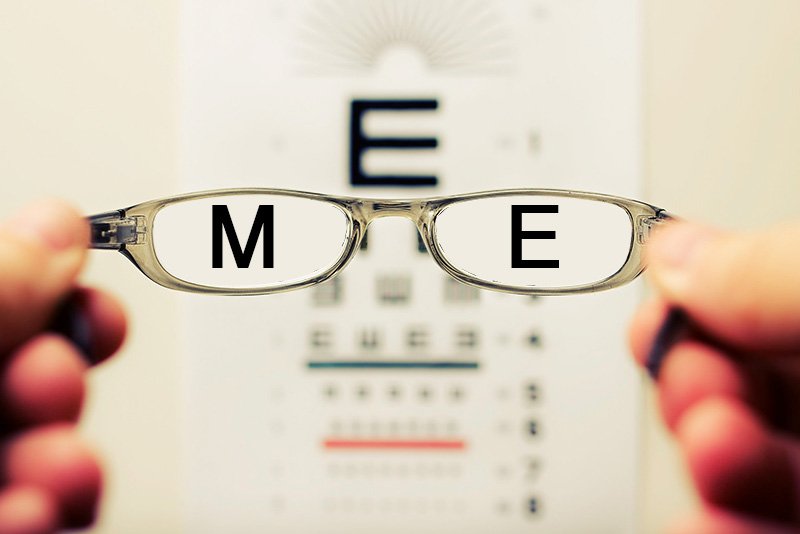Discipleship, Love one another, The Ecclesia
An appeal in troubled times (2): The bias that blinds
In our previous article we saw how trial exposes us and how easily we sink into childish behaviour that results in “them and us”. It would be good, wouldn’t it, if we could all agree? But, by agree we usually mean, they must agree with Me.
The problem of bias
We all think that our own views are correct. It’s very hard not to think that way because we can only view the world through the lens of our own experiences and knowledge. And, we are all biased. Proverbs regularly points this out:
- “The way of a fool is right in his own eyes: but he that hearkeneth unto counsel is wise.” (Prov. 12:15)
- “There is a way which seemeth right unto a man, but the end thereof are the ways of death.” (Prov. 14:12)
- “All the ways of a man are clean in his own eyes; but the LORD weigheth the spirits.” (Prov. 16:2)
- “A man’s heart deviseth his way: but the LORD directeth his steps.” (Prov. 16:9)
- “Every way of a man is right in his own eyes: but the LORD pondereth the hearts.”
(Prov. 21:2)

Sadly, our bias has an unfortunate consequence. We almost invariably look for evidence, no matter how flimsy, that bolsters our already-formed opinions. Likewise, any contrary evidence submitted against our beliefs is either discounted for the flimsiest of reasons or minimised because it could undermine the security we have built around our belief. This is a well-recognised phenomenon that has been given a name: “confirmation bias”.

Can you see the problem? If we are wrong in our understanding, then we are in danger of never being able to find the truth. People who grow up believing that we have an immortal soul find it hard to shake that belief, no matter what the Bible says.
After Christ gave the parable of the sower, the disciples asked why he spoke in parables, and he answered, “because they seeing see not; and hearing they hear not, neither do they understand” (Matt. 13:13). They are able to hear the message, but they can’t accept it. Why? Christ continued, “For this people’s heart is waxed gross, and their ears are dull of hearing, and their eyes they have closed; lest at any time they should see with their eyes, and hear with their ears, and should understand with their heart, and should be converted, and I should heal them” (v.15). In other words, they didn’t like what they heard because it didn’t fit in with their view, so they closed their ears, eyes, and minds. The good ground, Christ said, is “an honest and good heart” (Luke 8:15).
We are not honest, even with ourselves—especially with ourselves. The problem is that we view ourselves through the same biased lens.
Dangers of elevating personal views above the Word of God
Unfortunately, we can also be dishonest with God’s Word! We are adept at being blind to what the Word says and misapplying it to support our views. We look at God’s Word through the lens of our own values, assumptions, biases—even our conscience—and impose these upon God’s Word.

I have heard brothers and sisters in the current trial, who, in an attempt to bolster their personal stand, have taken up ideas promulgated by Christians. They point out that the word translated “witchcraft” or “sorceries” in Revelation 9:21 and 18:23 is the word pharmakeia, from which we get the English words pharmacy and pharmaceutical. And, by some jump in logic, they purport that these passages prophecy that the world will be deceived by “pharmakeia”, that is, pharmaceutical drugs and their makers.
This is not “honest and good” Bible study. The Bible’s use of a Greek word cannot take on the meaning of a modern English word simply because its etymological root is the same! In German, the word pharmacy is apotheke, in Dutch, apotheek, in Polish, apteka, all of which comes from the Greek apothēke, meaning “to put away, store, storehouse” 1. If we were to follow this kind of leap in logic we would translate Matthew 6:26 as, “Behold the fowls of the air: for they sow not, neither do they reap, nor gather into pharmacies” (instead of barns) and we would be able to turn the Greek word morphe in such passages as “he took upon him the form of a servant” (Phil.2:7) to mean, “he took upon him the hallucination of a servant”2.
Such loose logic in translating pharmakeia is either dishonesty or ignorance. This reasoning is borrowed from Christian sources who are ready to sensationalise anything in order to boost their own beliefs—or, sadly, to seek support or money from their sensationalism. Let not our desire for scriptural support for our views succumb to such false interpretation, for it casts doubt upon the validity of both our views and our ability to reason—and our honesty.
The assumption that God is on our side
Allied to bias is our belief that we are on God’s side, and therefore, God is on our side. We must always stand for what we believe, but we must be very careful when we claim to speak on God’s behalf.

Look at these examples.
Job’s three friends
Job’s three friends assumed that because Job suffered, God had brought this upon him (which He had) because Job had done something wicked (which he had not). Their persistent claims drove Job to defend himself and ultimately justify himself rather than God. They all assumed to know and defend God; eventually, Job concluded that he didn’t know and couldn’t defend Him. God pronounced that they all were wrong.
Joshua
When it was discovered that two men other than the chosen seventy prophecied, Joshua protested to Moses, “My lord Moses, forbid them.” And Moses said to Joshua, “Enviest thou for my sake? Would God that all the LORD’s people were prophets, and that the LORD would put his spirit upon them!” (Num. 11:24–29). Joshua was protecting a view he held about Moses. But it wasn’t the same as Moses’ view, or God’s.
Miriam and Aaron
“Hath the LORD indeed spoken only by Moses? Hath he not spoken also by us?” challenged Miriam and Aaron. God had spoken by them as well as Moses, but they were assuming a position equal to Moses, which they did not have. It was an assumption built upon their own assessment, not on God’s, as testified by the leprosy that rose up in Miriam’s body.
Korah, Dathan, and Abiram
Korah, Dathan, and Abiram similarly arrogated to themselves a position equal to Moses and Aaron. They charged Moses and Aaron, that “Ye take too much upon you, seeing all the congregation are holy, every one of them, and the LORD is among them: wherefore then lift ye up yourselves above the congregation of the LORD?” (Num. 16:3). Again, their view had a certain amount of truth, but their extended assumptions weren’t how God saw it, as testified by the earth swallowing up these rebels and their families.
David’s men
David’s men couldn’t believe their eyes when Saul walked alone into the cave in which they were hiding! They said to David, “Behold the day of which the LORD said unto thee, Behold, I will deliver thine enemy into thine hand, that thou mayest do to him as it shall seem good unto thee!” (1 Sam. 24:4). God had never said this at all, but God’s intention was “obvious”. God is telling you, David, here’s your opportunity to slay him. But David said unto his men, “The LORD forbid that I should do this thing unto my master, the LORD’S anointed, to stretch forth mine hand against him, seeing he is the anointed of the LORD” (v.6). David was right. While it was obvious to everyone, even Saul (v.18) that God had given Saul into David’s hands, God had not commanded David to slay Saul. It was purely an assumption based upon their interpretation of what God meant by events. God still expects His commandments and principles to be kept.
David’s courtiers
After his sin with Bathsheba, David was often ill and calamity frequent. His courts were filled with intrigue and treason, and he was despised and the butt of jokes. They thought that God was no longer with David and that his sin was unforgiven (Psalms 3:2; 22:6–8,12,13,16; 31:11,18; 69:7–12; 38:11; 25:2–3,15–21; 41:6–8; 64:1–6; 70:1–3; 71:4,7,10–11; 86:14,17). But they were wrong. While David was deeply troubled, he did not doubt God’s forgiveness, or that God was still with him (2 Sam. 12:13). Again, these people looked at how things appeared and used their understanding of the Word and God to support their assessment and felt assured that they were in the right. But their self-assurance was not rooted in God’s actual point of view.
Uzziah
Uzziah presumed he had a place higher than he actually held. He felt very close to God, for God had been with him (2 Chron. 26:5, 7,15). He had a view of his own relationship with God and he assumed that God would think it wonderful that Uzziah entered the holy place in the temple to offer incense himself. His intentions were no doubt noble, but they broke God’s commandments and he suffered the consequences (verses 17–19).
Our bias assumes
In all of these examples (and there are many more), assumption is the issue, and the assumption is that we have a better knowledge of God than our fellow, and, at times, than God Himself! Our problem is self. Paul says it this way: “their god is their belly”. In other words, they serve themselves.
Have no doubt about it, brothers and sisters, we are just the same, and must beware that we do not assume to know God better than our fellow over issues that arise, including vaccination, masks, lockdowns and so on.
Honestly, we can’t trust ourselves
Really, we can’t trust ourselves.
Solomon said, “Trust in the LORD with all thine heart; and lean not unto thine own understanding. In all thy ways acknowledge him, and he shall direct thy paths. Be not wise in thine own eyes: fear the LORD, and depart from evil” (Prov. 3:5–7). Paul says, “Be not wise in your own conceits”, or opinions (Rom. 12:16). Bluntly put, Paul says, “Let God be true, but every man a lier” (Rom. 3:4).
Honesty requires humility to accept our own untrustworthiness. Honesty also requires humility to accept that God can be trusted:
“Let the wicked forsake his way, and the unrighteous man his thoughts: and let him return unto the LORD. For my thoughts are not your thoughts, neither are your ways my ways, saith the LORD.” (Isaiah 55:7–8)
Unless we’re prepared to humble ourselves and acknowledge our own biases and values as being weak, faulty, and inadequate, we will invariably view God’s Word through our own distorted lenses. Honesty and humility are required to:
“Prove all things” (1 Thess. 5:21), by which it means,
“Proving what is acceptable unto the Lord” (Eph. 5:10), or even more fully,
“And be not conformed to this world: but be ye transformed by the renewing of your mind, that ye may prove what is that good, and acceptable, and perfect, will of God” (Rom. 12:2).
Honesty and humility never fears to open and discuss God’s Word so we can come to a genuine understanding while showing care and respect for others. When we disagree over matters where there is no direct command from God, let us humbly acknowledge that we can’t assume to know God’s view, for He hasn’t said it outrightly.
To the Law and to the testimony…

Footnotes
1 The word pharmakeia used in Revelation and Gal.5:20 in the German Bible is Zauberei and means “sourceries” in English.
Image acknowledgements
Feature image: boys on hay eating apples Image by Vicki_B on Pixabay (modified)
ME Glasses test: Photo by David Travis on Unsplash (modified)
Confirmation bias argument: CC0 Public Domain
ME Glasses and Word of God: Photo by Jamaica Cabahug on Unsplash (modified)
Arm of right in water: a composite of the following: arm by Clay Banks on Unsplash, sea photo: Image by Matt Hardy on Pixabay
Word of God and clear glasses: Photo by Timothy Eberly on Unsplash
